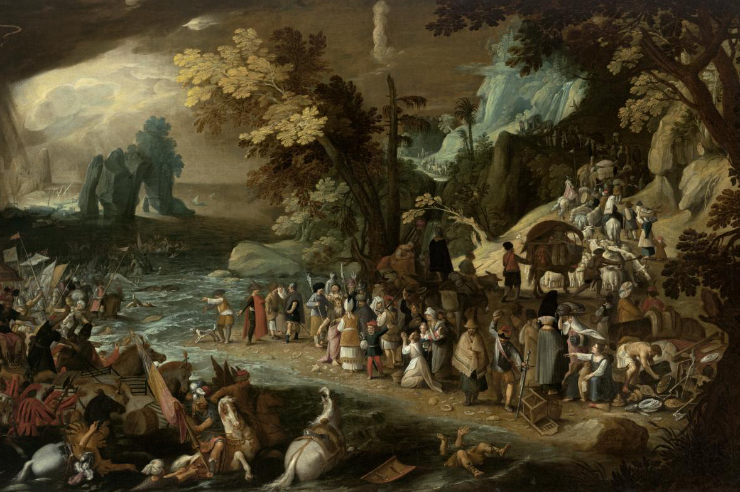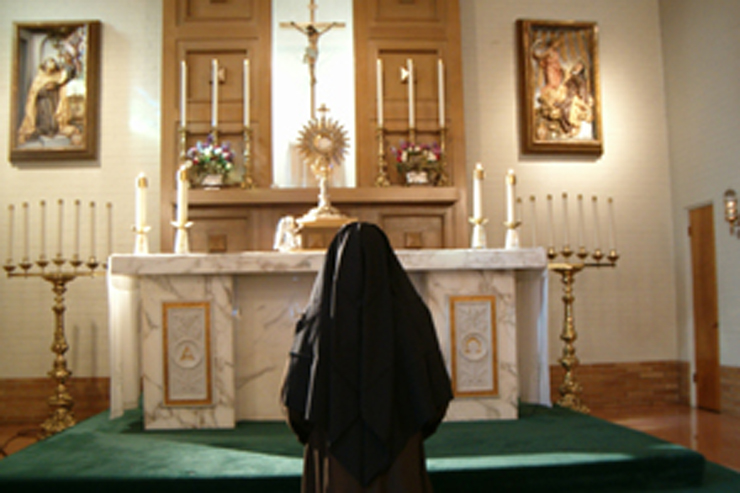“…if anyone wishes to seriously exercise the spiritual life, he had better know that the company of people that hold our own faith and worship in our own churches is a most difficult company to keep. And we ought not to pretend we can follow God very far unless we know that it is a desert like asceticism.”
I write today as a ghost with a pen, for I wish to convey a homily indelibly etched onto my soul. Father Mark’s words have been resistant to the ravages of forgetfulness that normally attend the passage of time encumbered by the busyness of the modern age. In his homily he spoke of permanent things belonging to the desert, desertion, temptation, suffering, and redemption. All the while his voice sang with the poetry and power of a man lifted to lofty spiritual heights by the grace of the Holy Spirit. I have striven not to abbreviate more than word limits allow, but cuts had to be made and certain substitutions put forth. I lament that the mysteries to which Fr. Mark eluded will suffer diminishment naturally lost in translation from the rich spoken word to lifeless digital print. I do beg your understanding and trust that these written utterances may serve as stepping stones to an adequate understanding of Fr. Mark’s intention to colonize heaven.
Fr. Mark spoke thus:
“Tis the season to embark upon the Lenten sojourn into the desert. We have been beckoned by the Holy Spirit, as was Christ, to enter the spiritual wilderness to suffer baptism by the fires of temptation. The desert is a highway and a process to assist us in preparing for the spiritual combat into which all Christian souls are drawn. The desert provides a kind of journey, an outline of a means and a medium whereby we are made more open to God’s kingdom and more receptive to God’s Truth. The desert is the course of purification by which believers are prepared to welcome God.
The archetypical theme for the temptation in the desert is the Exodus recounted by Moses, leading the children of Israel in the desert for forty years. Surely we realize that the forty years wandering the desert was that original means of sanctification by which God took a people who had been slaves for centuries and had been forgetful of Him because of drudgery, and God used the Exodus to transform them into a nation wholly and peculiarly His own in the world.
Another wonderful desert figure was John the Baptist, a type of Elijah come back in the flesh, who was raised in the desert. Imagine his mother, aged Elizabeth who bore him. After she had weaned the child John, she gave him to the Essenian desert monks, the same monks who produced the Dead Sea scrolls. She gave her own son to the desert. John the Baptist was part of the means by which Israel was made ready to welcome the work of God, the Messiah, the Christ, when He would come.
Finally, Jesus himself is a desert figure who began his public life with forty days and forty nights fasting in the wilderness, in the desert waste, preparing to do what all of us must do in a certain sense, the desert prepared Him for community life. The time in the desert is a time of retreat and asceticism. It prepared Him for the genuine work of living amongst his own followers and in the company of those who claimed to belong to God. And if anyone wishes to seriously exercise the spiritual life, he had better know that the company of people that hold our own faith and worship in our own churches is a most difficult company to keep. And we ought not to pretend we can follow God very far unless we know that it is a desert like asceticism. Sometimes just to keep company with our spouses and our children, with our parents and our families, with our neighbors and our parishioners possesses a desert like aspect, an aridity, a barrenness, a surprising lack of refreshment and a loss of comfort associated with all the primary commitments of life, Jesus was prepared not just for His Cross by His time in the desert, He was prepared for his disciples.
The Disciples are the primary punctuation even of His suffering, for He would say to Pilate “if my kingdom were of this world, my disciples would be here with me now. As you can see, they are not.” He was alone before his accuser, before his temporal judge, he was deserted (and there is hidden in the word desertion, the desert) to be lonely and rejected is to be deserted, as if in the desert. When Jesus breathed His last breath, and made his final outcry of human suffering and lamentation, He did not cry out “my God my God the nails.” He did not cry out “my God, the scourges and the welts.” He cried out “my God, my God, why hast thou forsaken me?” He cried out in abandonment, loneliness, rejection, isolation, desertion and He was forsaken, He who began His public life in the desert ended it deserted.
And it is right that we should follow Him now in the Lenten Season into the desert. Let us not romanticize it too quickly, let us not go too far in making the desert a place of serene natural beauty. Though of course it is a place of supernatural beauty, and a place of exquisite purity, but our first intuition of the desert will also be true; if you are ever truly stuck there, you are forsaken. It is apparently God-forsaken and that is the kind of forsakenness of which Jesus Himself cries out when he dies. But that place of the greatest God-forsakenness is at the same moment the place of the greatest Godly affirmation.
In that desert is divine espousal and adoption! And Christ, the beloved son of the eternal Father, gives to us in His Body, the capacity for union with God by following us into that desert waste where we have been alienated from God and would have been alienated forever. He was in the end nothing more and nothing less than a Good Shepherd who followed the sheep into the lava waste, into the desert wasteland and in the desert He found the one who was lost. But He was enduring the same losses for our sake and for our recovery.
It is altogether inadmissible for a Christian to say “nobody knows how I feel.” We can lament in this vale of tears and vent our frustrations. It is a blessing in many ways to pray the psalms of David and we can follow David far along the path of complaint and lamentation and it might turn our greatest dis-ease into a prayer. But we ought not to say “nobody knows how I feel.” We cannot look at the Cross of our Lord Jesus Christ with even the smallest modicum of faith and rightly say that we are alone in our suffering.
In our suffering most especially, we are adopted and we are espoused to God. In our suffering, the Body of our Lord Jesus Christ is immediately provided for our reconciliation and our peace. Long ago the prophet Isaiah had foretold it when he said “the day is coming when the knowledge of the Lord will cover the earth like water covers the sea.” By appearances, the knowledge of the Lord grows thinner on earth, hardly a vapor of the morning is the knowledge of the Lord on earth these days, and that surely evaporates by midday. But Isiah said it will cover the earth like the sea? And so we must contemplate what covers the earth like the sea? Except human suffering itself! One need not look much further than out the front door or at the cable news to know that it is human suffering that covers the earth.
It is the knowledge of the Lord that covers the earth in suffering. And it is in God’s visitation to suffering that, that which was alienation and despair, that which was the desert of human rejection and loneliness has become the garden of divine adoption and espousal. And if suffering can pray, imagine! If suffering can pray, just how much hope is there for our world after all? And that would be the secret that the whole world is groaning to learn and all creation is groaning to hear, that human suffering is a means of prayer. It is holy, that human suffering is redeemed and redeemable, lovable and beloved and renders us dearer to God. Christ makes the means of reconciliation.
Though God could remove the suffering, He lets the suffering be, He makes it the means of love, the medium of friendship, to make it the process of a desert passage whereby we come home at last not just to who God is, but even to the truth of who we are. Home at last to the deepest truth within us and the highest truth in heaven. The temptations, the suffering, the trials and the heartaches, these are the fires of purification and sanctification that prepare us for that heavenly country, let us turn our suffering into a prayer!”
This is but a glimpse of Fr. Mark’s stirring homily. He himself has been called deep into the desert by forsakenness. His words will echo no more in the parishes, cathedrals and chapels, he has been silenced by sorrowful exile. Please pray for him that his suffering is redemptive, and that his words may continue to provide succor and strength to other wilderness sojourners suffering the fires of temptation in the desert.















